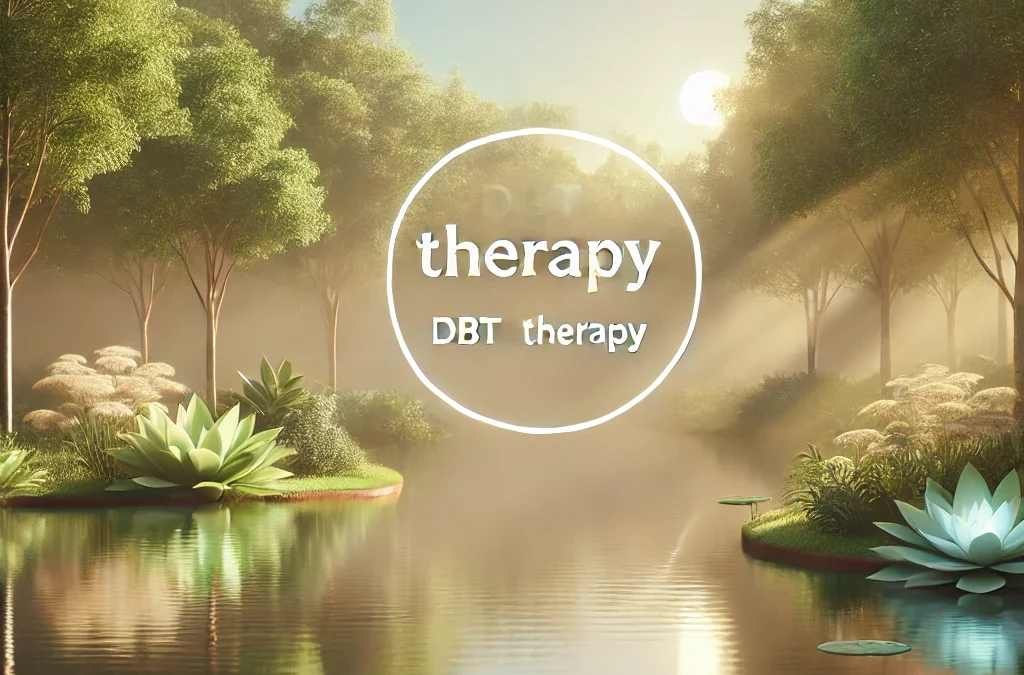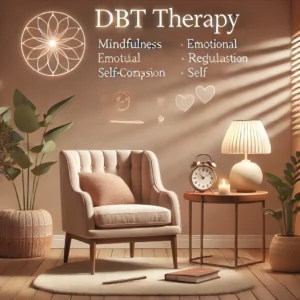
by Ihar | Jan 11, 2025 | DBT Therapy
Dialectical Behaviour Therapy (DBT) is a transformative approach that equips individuals with skills to manage intense emotions, navigate interpersonal challenges, and foster mental resilience. With the growing popularity of Online DBT, accessing these life-changing techniques has become more convenient than ever. Whether you’re new to DBT Therapy or looking to deepen your practice, these ten tips will help you make the most of your journey.
1. Embrace Mindfulness in Everyday Life
Mindfulness is the cornerstone of DBT Therapy. It involves being present in the moment without judgment. Start small by focusing on your breath or paying attention to your surroundings. Incorporating mindfulness into daily activities, such as eating or walking, can help ground you and reduce emotional reactivity.
Quick Tip: Set aside 5 minutes each morning for mindfulness meditation to set a positive tone for the day.
2. Build a Distress Tolerance Toolkit
Distress tolerance skills are essential for managing crisis situations without making them worse. Techniques like self-soothing, distraction, and radical acceptance can help you stay calm during challenging times.
Quick Tip: Create a list of activities or objects that bring you comfort, such as listening to music, taking a warm bath, or holding a favorite object.
3. Practice Emotion Regulation Daily
DBT Therapy emphasises understanding and managing emotions effectively. Identify your emotional triggers and work on strategies to prevent them from escalating. Journaling can be an excellent tool for tracking emotions and identifying patterns.
Quick Tip: Use an emotion wheel to help name and understand your feelings more accurately.
4. Strengthen Interpersonal Effectiveness Skills
Healthy relationships are key to emotional well-being. DBT Therapy provides tools for effective communication, such as the DEAR MAN skill (Describe, Express, Assert, Reinforce, Mindful, Appear Confident, Negotiate). Practice these techniques to set boundaries and express your needs clearly.
Quick Tip: Role-play difficult conversations with a trusted friend or therapist to build confidence.
5. Leverage the Flexibility of Online DBT
Online DBT offers the same robust skill-building as in-person sessions but with added convenience. Make the most of this format by ensuring you have a quiet, distraction-free space for sessions and reliable technology.
Quick Tip: Schedule Online DBT sessions at a time when you’re most focused and alert, such as mornings or early afternoons.
6. Engage Fully in Group Skills Training
Group skills training is a vital component of DBT Therapy, providing a supportive environment to learn and practice new techniques. Engaging with others facing similar challenges can foster a sense of community and accountability.

A diverse group of individuals attending an Online DBT group skills training session, highlighting the community and effectiveness of DBT Therapy for emotional well-being and growth.
Quick Tip: Actively participate in discussions and share your experiences during group sessions to maximize your learning.
7. Utilise Phone Coaching Wisely
Phone coaching is a unique feature of DBT Therapy that provides real-time guidance for applying skills in everyday life. Use this resource sparingly and strategically to navigate challenging moments.
Quick Tip: Keep a list of specific questions or scenarios you’d like to discuss during phone coaching to make the most of the session.
8. Prioritise Homework Assignments
DBT Therapy often includes homework assignments to reinforce skills learned in sessions. Treat these assignments as an integral part of your growth and make time to complete them thoughtfully.
Quick Tip: Set a specific time each day to review and work on your DBT homework, such as after dinner or before bed.
9. Celebrate Small Wins
Progress in DBT Therapy often happens gradually. Recognising and celebrating small achievements, like using a distress tolerance skill during a tough moment, can boost motivation and confidence.
Quick Tip: Keep a gratitude or success journal to track and celebrate your accomplishments, no matter how small.
10. Stay Consistent with Your Practice
Consistency is key to reaping the full benefits of DBT Therapy. Commit to regular sessions, practice skills daily, and stay engaged in the process, whether in-person or through Online DBT.
Quick Tip: Set reminders on your phone or calendar to practice mindfulness, review DBT skills, or attend therapy sessions.
The Role of Online DBT in Modern Mental Health Care
The advent of Online DBT has made accessing high-quality mental health care easier and more inclusive. With the flexibility of virtual sessions, individuals can prioritise their emotional well-being without disrupting their daily routines. Whether you’re seeking to manage overwhelming emotions, improve relationships, or build resilience, Online DBT offers a structured and effective path forward.
Final Thoughts: Empower Yourself with DBT Therapy
DBT Therapy is more than just a treatment; it’s a toolkit for living a balanced and fulfilling life. By incorporating these ten tips into your practice, you can enhance your skills, deepen your self-awareness, and create lasting change. Whether you’re working with a therapist in person or exploring the possibilities of Online DBT, your commitment to personal growth is the most crucial step.
Start your journey today and discover the transformative power of DBT Therapy in building emotional resilience and improving your quality of life.

by Ihar | Dec 6, 2024 | uncategorized
10 Reasons to Use DBT Therapy: Unlocking a Path to Emotional Balance
Dialectical Behavior Therapy (DBT) is a transformative, evidence-based approach that helps individuals build healthier emotional responses, improve relationships, and find balance in their lives. Originally developed by Dr. Marsha Linehan for individuals with Borderline Personality Disorder (BPD), DBT therapy has since evolved to address various mental health conditions. Whether in person or through DBT online, its effectiveness lies in its structured approach to fostering emotional regulation, mindfulness, interpersonal skills, and distress tolerance.
If you’re considering starting therapy or exploring new approaches, here are 10 compelling reasons why DBT therapy might be the right fit for you.
1. Effective for Managing Emotional Dysregulation
One of the hallmark benefits of DBT therapy is its focus on helping individuals manage intense emotions. DBT equips clients with practical skills to identify, understand, and regulate emotions that might otherwise feel overwhelming. Whether dealing with chronic anger, sadness, or anxiety, DBT provides tools to regain emotional balance.
2. Addresses a Wide Range of Mental Health Issues
While initially created for BPD, DBT is now widely used for treating various conditions, including:
- Anxiety
- Depression
- Post-Traumatic Stress Disorder (PTSD)
- Eating disorders
- Substance use disorders
In both traditional and DBT online formats, its versatility makes it a go-to choice for individuals seeking comprehensive mental health support.
3. Emphasises Mindfulness
Mindfulness, a cornerstone of DBT therapy, helps individuals become more aware of their thoughts, emotions, and surroundings. By practicing mindfulness, clients learn to live in the present moment and reduce reactive tendencies. This skill is particularly helpful for reducing anxiety and stress, improving overall well-being.

Find the light within! DBT therapy and DBT online provide the tools to transform emotional struggles into a journey of growth and balance. Start your healing today!
4. Offers a Structured and Skills-Based Approach
DBT is unique in its structured framework, which includes four key modules:
- Mindfulness: Cultivating present-moment awareness.
- Distress Tolerance: Developing resilience in high-stress situations.
- Emotion Regulation: Managing emotional responses effectively.
- Interpersonal Effectiveness: Building healthy relationships.
Whether you attend in-person sessions or participate in DBT online, the structured approach ensures that you gain practical, actionable skills for your daily life.
5. Proven Track Record of Success
Numerous studies have demonstrated the effectiveness of DBT in improving mental health outcomes. For individuals with BPD, research shows that DBT therapy significantly reduces suicidal behaviors and emotional distress. Additionally, clients with depression, anxiety, and other conditions report improved emotional stability and quality of life after completing DBT programs.
6. Focuses on Building Resilience in Crisis
Life’s challenges can feel overwhelming, but DBT teaches clients how to navigate crises without resorting to harmful behaviors. The distress tolerance module equips individuals with tools like radical acceptance, self-soothing techniques, and distraction strategies to handle difficult moments. This resilience extends beyond therapy, empowering clients to face life’s unpredictability with confidence.
7. Enhances Relationship Skills
Healthy relationships are essential for mental well-being, and DBT dedicates an entire module to improving interpersonal effectiveness. Clients learn how to:
- Set boundaries.
- Communicate needs assertively.
- Resolve conflicts constructively.
Whether you’re managing personal relationships or professional dynamics, the skills gained through DBT therapy can lead to stronger, more fulfilling connections.
8. Accessible Through DBT Online
The flexibility of DBT online programs makes it easier than ever to access high-quality mental health support. Online therapy offers the same structured approach as in-person sessions, making it ideal for individuals with busy schedules, mobility issues, or those living in remote areas. With virtual platforms, you can experience the benefits of DBT from the comfort of your home.
9. Tailored to Individual Needs
DBT recognizes that everyone’s journey is unique. Therapy often combines group skills training with one-on-one sessions, where therapists help clients apply DBT principles to their specific circumstances. This personalized approach ensures that DBT therapy meets the individual’s goals and challenges, fostering meaningful progress.
10. Promotes Long-Term Change
Unlike some short-term therapies that focus solely on symptom relief, DBT aims to create lasting change. The skills learned in DBT therapy are designed to become lifelong tools for managing emotions, improving relationships, and navigating challenges. This long-term focus helps clients build a foundation for sustained emotional health and well-being.
How to Start Your DBT Journey
If these reasons resonate with you, consider exploring your options for DBT therapy. Whether you prefer face-to-face sessions or the convenience of DBT online, here’s how to get started:
- Research Providers: Look for licensed therapists trained in DBT.
- Evaluate Your Needs: Decide whether in-person or online therapy suits your lifestyle.
- Ask Questions: Inquire about the therapist’s experience and the program structure.
- Commit to the Process: DBT requires active participation, so be ready to engage with the materials and exercises.
Why Choose DBT Online?
For many individuals, DBT online offers unparalleled flexibility and accessibility. Virtual sessions eliminate the need for travel, provide more scheduling options, and allow clients to participate from anywhere. Additionally, online platforms often include digital tools, like worksheets and guided practices, to enhance the therapeutic experience.
Final Thoughts
Whether you’re struggling with emotional regulation, interpersonal challenges, or other mental health concerns, DBT therapy offers a proven, practical path to healing. With its focus on mindfulness, resilience, and skill-building, DBT equips clients with the tools they need to lead more balanced, fulfilling lives. And with the availability of DBT online, accessing this transformative therapy has never been easier.
If you’re ready to take control of your emotional health, consider starting your DBT journey today. The path to emotional well-being begins with the first step. Let DBT guide you toward a brighter, more balanced future.

by Ihar | Nov 18, 2024 | DBT Therapy
DBT Therapy (Dialectical Behavior Therapy) has gained widespread recognition for its effectiveness in addressing a range of mental health challenges, including
borderline personality disorder (BPD), emotional dysregulation, and more. Whether you’re exploring
DBT therapy online or attending in-person sessions, understanding its core principles can enhance your therapeutic experience. In this post, we’ll share five top tips to help you make the most of DBT therapy and explore how online therapy can fit seamlessly into your mental health journey.
1. Understand the Core Components of DBT Therapy
DBT therapy is built around four core components: mindfulness, distress tolerance, emotion regulation, and interpersonal effectiveness. Each of these skills is designed to address specific challenges:
- Mindfulness helps you stay present and aware, even in emotionally charged situations.
- Distress Tolerance equips you with tools to manage crises without making the situation worse.
- Emotion Regulation teaches you to identify, understand, and manage your emotions effectively.
- Interpersonal Effectiveness helps you navigate relationships, assert your needs, and maintain boundaries.
Before starting DBT therapy, familiarize yourself with these components. If you’re engaging with DBT therapy online, many programs provide resources or introductory modules to help you understand these skills before diving into sessions.
2. Practice Skills Consistently
Consistency is key when it comes to mastering DBT skills. The strategies taught in DBT therapy require regular practice to become second nature. For instance:
- Start your day with a brief mindfulness exercise, such as deep breathing or a body scan.
- Use emotion regulation skills, like opposite action, when faced with difficult emotions.
- Keep a journal to track your progress with interpersonal effectiveness and note what works.
Online DBT platforms often include practice assignments, worksheets, and digital reminders to help you stay on track. By integrating these tools into your routine, you can build confidence and see tangible results.

Achieve mindfulness and emotional balance with these expert tips for DBT therapy and DBT online.”
3. Leverage the Benefits of DBT Online
The rise of DBT therapy online has made this evidence-based approach more accessible than ever. Online therapy offers several advantages:
- Convenience: Attend sessions from the comfort of your home, saving time and reducing stress.
- Flexibility: Online platforms often offer a range of session times, making it easier to fit therapy into your schedule.
- Privacy: Virtual therapy ensures discretion, especially if you’re hesitant about attending in-person sessions.
Many online DBT programs are designed to be as interactive as face-to-face therapy. They may include group sessions, one-on-one consultations, and access to digital tools that help you track your progress. Explore your options to find a platform that suits your needs and preferences.
4. Set Realistic Goals for Progress
DBT therapy is a journey, not a quick fix. It’s important to set realistic and measurable goals for your progress. These goals might include:
- Reducing the frequency or intensity of emotional outbursts.
- Improving communication with loved ones.
- Developing healthier coping mechanisms for stress.
Discuss your goals with your therapist at the outset of your therapy. If you’re participating in DBT therapy online, many platforms provide goal-setting tools and progress trackers. Remember, small, consistent steps can lead to significant improvements over time.
5. Engage Actively in Group Sessions
Group therapy is a vital component of DBT therapy. It provides a supportive environment where you can learn from others and practice DBT skills in real-time. If you’re participating in DBT therapy online, group sessions are often conducted via video conferencing, making it easy to connect with others from diverse backgrounds.
Here are some tips for making the most of group sessions:
- Be open to sharing your experiences while respecting the privacy of others.
- Actively participate in role-plays and exercises.
- Take notes during sessions and review them afterward to reinforce your learning.
Group therapy not only enhances your understanding of DBT skills but also provides a sense of community and shared purpose.
Why DBT Therapy is Life-Changing
DBT therapy empowers individuals to take control of their emotional well-being and lead more fulfilling lives. Whether you’re attending sessions in person or opting for the flexibility of DBT therapy online, the key to success lies in commitment, practice, and a willingness to embrace change. By following these five tips, you can maximize the benefits of DBT therapy and build a foundation for lasting mental health improvements.
If you’re considering starting DBT therapy or exploring online options, take the first step today. Many qualified therapists and platforms specialize in delivering this transformative approach. With patience and effort, you’ll find the tools you need to thrive.
Looking for DBT Therapy Online?
At DBT London, we offer expert-led online DBT therapy designed to fit your lifestyle. Our comprehensive programs provide the support, skills, and flexibility you need to succeed. Contact us today to learn more about how DBT therapy can help you or your loved ones.

by Jason Ward | Nov 14, 2024 | uncategorized
Dialectical Behavior Therapy, or DBT, has gained popularity as a structured and effective approach for managing a variety of mental health conditions. Originally developed to help individuals with borderline personality disorder (BPD), DBT therapy now offers coping tools for a broader audience, including those dealing with anxiety, depression, and stress. Whether you’re attending in-person sessions or exploring online DBT, here are ten essential DBT therapy tips to help you along your journey.
1. Practice Mindfulness Regularly
Mindfulness is a cornerstone of DBT therapy. By focusing on the present moment, you can manage overwhelming emotions and improve your concentration. Mindfulness is about observing your feelings, thoughts, and physical sensations without judgment. You can integrate it into daily activities like eating, showering, or walking by simply paying attention to each sensation. Try setting aside a few minutes each day to practice mindfulness—it can make a big difference.
2. Set Realistic Goals with SMART Criteria
In DBT, goal-setting is crucial for progress. The SMART criteria—Specific, Measurable, Achievable, Relevant, and Time-bound—helps you establish realistic goals that you’re more likely to achieve. For example, instead of setting a vague goal like “reduce stress,” try something specific like “practice deep breathing exercises for five minutes, three times a week.” With online DBT, you can often track your goals through worksheets and apps, making it easier to monitor progress.
3. Use Radical Acceptance to Reduce Suffering
Radical acceptance is a powerful tool in DBT therapy. It means accepting things as they are, rather than how you wish they were. This doesn’t mean you agree with or approve of the situation, but by accepting reality, you reduce additional emotional pain. Practice radical acceptance when faced with uncontrollable situations to cultivate peace and focus on things within your control.
4. Take Advantage of Online DBT Resources
The flexibility of online DBT has made therapy more accessible than ever. Many platforms offer virtual sessions, video lessons, and even downloadable worksheets to reinforce DBT skills. Whether you’re looking for individual therapy or group sessions, online DBT can be a practical choice, especially if in-person options aren’t available in your area. It also allows you to practice skills in the environment where you’ll be using them—your everyday life.

An inviting therapy room designed for DBT, with soft lighting, cozy seating, and mindfulness tools, creating a serene space for emotional growth and mental health support.
5. Practice Opposite Action to Manage Emotions
Opposite Action is a unique skill in DBT that helps you manage difficult emotions by acting opposite to what your feelings tell you. For instance, if you’re feeling angry, try to engage in a compassionate or positive action, such as writing a gratitude list. This technique works because actions can influence emotions. Next time you feel a challenging emotion, consider how the opposite action could alter your perspective.
6. Build a Crisis Survival Kit
When emotions become overwhelming, it helps to have a crisis survival kit—a collection of items and practices that can calm you in the moment. Your kit might include a list of coping statements, photos that evoke happy memories, or a playlist of calming music. Both in-person and online DBT therapists encourage creating a personalized kit to manage intense moments effectively.
STOP stands for Stop, Take a Step Back, Observe, and Proceed Mindfully. This DBT skill is especially useful in stressful or high-stakes situations where emotional regulation is essential. By pausing and observing your feelings, thoughts, and surroundings, you avoid reactive behaviors that you might later regret. This skill is easy to remember and can be practiced anywhere, making it perfect for both in-person and online DBT contexts.
8. Practice Self-Compassion to Support Progress
DBT therapy emphasizes self-compassion and understanding. Self-compassion involves being kind to yourself, especially during challenging moments. Many people find self-criticism comes easily, but this mindset can hinder progress in therapy. Replace self-critical thoughts with affirmations like “I am doing my best” or “I am worthy of kindness.” Online DBT programs often include modules or exercises that focus on building self-compassion, which can further reinforce your growth.
9. Improve Relationships with DEAR MAN
The DEAR MAN technique is part of the DBT module on interpersonal effectiveness and is designed to help you communicate assertively. DEAR MAN stands for Describe, Express, Assert, Reinforce, Mindful, Appear Confident, and Negotiate. By following these steps, you can improve communication, strengthen relationships, and advocate for your needs without escalating conflicts. Many online DBT platforms provide worksheets and examples to help you practice DEAR MAN effectively.
10. Celebrate Small Wins to Stay Motivated
Change is often slow in DBT therapy, but celebrating small achievements can keep you motivated. Each time you complete a skill or make a positive change, acknowledge it. These small wins accumulate and build your confidence in the DBT process. Whether you’re working with an in-person or online DBT therapist, reflecting on progress, no matter how small, reinforces a positive mindset and boosts commitment.
Final Thoughts on DBT Therapy
DBT therapy offers practical and actionable tools to help manage intense emotions, improve relationships, and enhance overall mental health. With the rise of online DBT, therapy is now more accessible and adaptable to diverse needs. Remember, DBT skills require practice and patience, so give yourself time to incorporate these techniques into your life. By following these tips, you’ll be better equipped to handle life’s challenges with resilience and balance.
SEO Optimized Content Recap:
Keywords:
- Primary: DBT Therapy, Online DBT
- Secondary: Mindfulness, Radical Acceptance, Emotional Regulation, Interpersonal Effectiveness, Self-Compassion, Opposite Action








